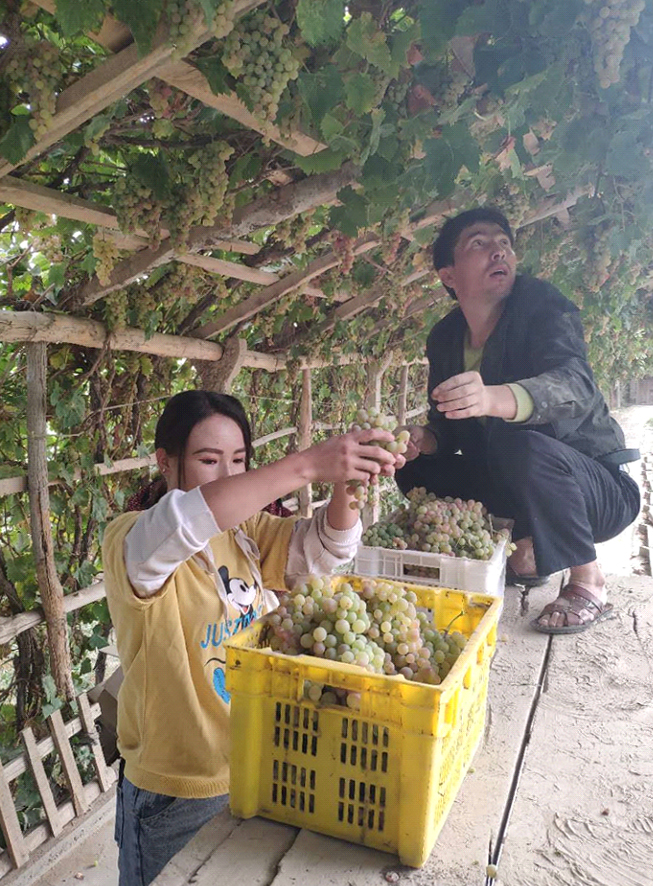Villagers in southern Xinjiang escape poverty through grapevine


Grape trellises are a common sight in rural areas in the south of the Xinjiang Uygur autonomous region. The plants not only give people precious shade in the scorching summer heat, but also bear fruit that is famously sweet and juicy.
One such place is the village of Yujmilik in Yutian county, on the southern edge of Taklimakan, the world's second-largest shifting desert. The region is suitable for the growth of grapes thanks to the ample sunshine and pristine snowmelt flowing down from the Kunlun Mountains.
Yujmilik has a long history of cultivating grapes. But in the past, the sweetness of the fruit did not translate to prosperity for the villagers.
In 2016, 526 of its 2,524 villagers lived below the national poverty line-a per capita income of less than 2,300 yuan ($336) a year.
One important cause of the high poverty rate was a lack of alternative sources of income.
"In a bad year, the villagers would see their incomes reduced dramatically, pushing families into financial difficulty," said Tian Jianhua, head of a working team sent from Yutian county to Yujmilik.
To address the problem, efforts have been made to diversify villagers' sources of income.
Since last year, grape leaves, which in the past were deemed to have no economic value and used to feed livestock, have become a new source of income.
The leaves are exported to countries such as Chile, where they are used as wrapping for glutinous rice and made into canned food, said Zulfukar Nijat, Party chief of the village.
Growers can earn 5 yuan for each kilogram of leaves they sell, and a hectare of land planted with grape vines can produce about 6 metric tons of leaves.
Arzgu Abduhayni, a villager in Yujmilik, said the picking season for grape leaves lasts from May to September. Her family grows grapes on 4,000 sq m of land, and the income from sales of grapes and leaves was more than 50,000 yuan last year.
According to the government of Langan township, which administers Yujmilik, the output value of the township's grape industry reached 148 million yuan last year, of which 24 million yuan came from grape leaf sales.
Efforts have also been made to boost the added value of the grape industry.
Since 2018, a new grape variety called Centennial Seedless has been grown on a trial basis on about 33 hectares of land. The village has a total of 180 hectares of land planted with grapes.
"The new breed, after being dried into raisins, can be sold at 60 yuan a kg, compared with 25 to 40 yuan per kg for a traditionally grown breed called Concubine Fragrance Red," Tian said. The new breed is expected to enter its full bearing age in the next few years, he added.
In addition, agricultural technicians have been invited to train farmers to improve their grape cultivation skills, such as the trimming and binding of vines and use of organic fertilizer, Tian said.
The village has also gone the extra mile to boost employment for impoverished people.
For example, Aykhan Aysan's family of six, which includes three children and one elderly person, relied on the income from grapes grown on 3,000 sq m of land. Their annual income was less than 20,000 yuan.
Last year, she began working for a grape-themed agritourism attraction in the village, where tourists can pick grapes and enjoy the leisure of rural life. She earns around 2,000 yuan a month by working there.
Aykhan said that as a result, her family's revenue more than doubled to 43,600 yuan.
So far, 784 villagers have found jobs, a majority of which were obtained with the help of the government. Among them, 62 have found jobs outside Hotan prefecture, Tian said.
Thanks to all the measures put in place, all poor households in the village have been lifted out of poverty. In the past 12 months, the annual average income of its residents reached more than 12,000 yuan.
- World's longest expressway tunnel to open to traffic in Xinjiang by year-end
- HKSAR govt releases first-ever Chinese medicine development blueprint
- Ten photos from across China: Dec 12 - 18
- Visa-free measures spur surge in visitors
- Avalanche in Xinjiang leaves one dead
- Research ward at children's hospital in Shanghai treats over 200 patients with rare diseases





































